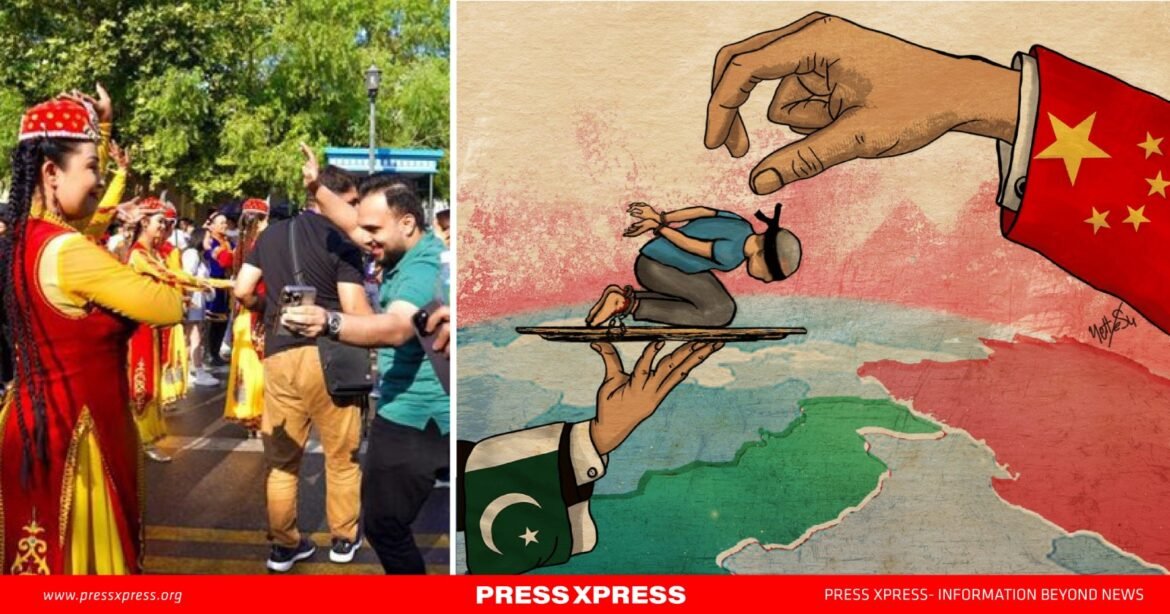Key Highlights:
Endorsing Oppression Abroad: Pakistan’s Council of Islamic Ideology (CII) praised China’s treatment of Uyghur Muslims, contradicting global reports of severe human rights abuses
Persecuting Minorities at Home: The CII pushes for stricter repression of Ahmadis and opposes progressive laws, promoting discrimination and extremism within Pakistan
Foreign Policy Contradictions: While Pakistan claims to defend Muslim rights globally, its economic ties with China drive silence on Uyghur oppression, exposing double standards
In a baffling move, Pakistan’s Council of Islamic Ideology (CII)—a constitutional body advising the government on Islamic issues—praised China’s treatment of Uyghur Muslims in Xinjiang as an example of religious liberty. This endorsement has sparked international outrage, especially given the council’s history of advocating harsh persecution of religious minorities within Pakistan, particularly the Ahmadi Muslim community.
The CII recently sent an 11-member delegation to China, including a visit to the controversial Xinjiang region, at the Chinese government’s invitation. Upon their return, Dr. Muhammad Ragheb Hussain Naeemi, chairman of the CII, declared that Muslims in Xinjiang enjoy ‘economic and religious freedom’ under Chinese policies. He also commended China for its ‘successful’ eradication of extremism and terrorism.
This glowing assessment contradicts the findings of human rights organizations and governments worldwide. Numerous investigations have revealed that China has carried out mass detention, surveillance, forced labor, and cultural suppression against Uyghurs and other Muslim minorities in Xinjiang—actions that many experts consider genocidal. The CII’s endorsement of China’s repressive policies raises troubling questions about the council’s independence, integrity, and real motives.
A History of Domestic Repression
The CII’s controversial praise of China fits a broader pattern of supporting authoritarian control over religious expression, both domestically and abroad. Founded in 1962, the council, composed of 20 religious scholars from largely conservative backgrounds, has often advocated for regressive policies. While its recommendations are not legally binding, they carry significant influence and bolster extremism within Pakistani society.
A prime example of the council’s oppressive stance is its relentless campaign against the Ahmadi Muslims, a minority sect declared non-Muslim by Pakistan’s 1974 constitutional amendment. Ahmadis already face severe discrimination in legal, social, and economic spheres. However, the council frequently pushes for even stricter measures.
After Pakistan’s Supreme Court ruled that Ahmadis could practice their faith privately, the council issued a shocking response, demanding that Ahmadis be prohibited from professing or preaching ‘even within their homes or places of worship’. It went so far as to insist that Ahmadis be ‘unequivocally declared as apostates’, inciting further marginalization and potential violence against the community.
The council’s hardline views extend beyond religious minorities. It has consistently opposed legislation aimed at protecting women’s rights and preventing domestic violence. In one infamous instance, the council argued that husbands should be allowed to ‘lightly beat’ disobedient wives, sparking outrage across Pakistan and internationally. It has also controversially declared that girls as young as nine years old can be married, dismissing the concerns of child rights advocates.
In economic matters, the CII’s proposals have been equally impractical, such as calling for the abolition of Pakistan’s paper currency in favor of gold and silver coins—an idea widely criticized by economists as disastrous for the nation’s fragile economy.
Aligning with China: A Cynical Worldview

The CII’s endorsement of China’s Uyghur policies reflects a deeply cynical view of religious freedom. Instead of promoting genuine pluralism and tolerance, the council seems to equate religious liberty with the state’s ability to dictate and control religious expression. This stance aligns with China’s authoritarian approach, where suppression of minority groups is framed as a campaign against extremism.
Pakistan’s silence on the oppression of Uyghurs is not surprising, given its strategic and economic dependence on China. As a self-declared defender of Muslim rights worldwide, Pakistan has long maintained a contradictory stance by staying silent on Chinese abuses against Muslims. However, the CII’s endorsement takes this hypocrisy to a new level by actively legitimizing China’s oppressive policies.
The CII’s troubling praise for China further complicates Pakistan’s foreign policy dynamics. While the country presents itself as a champion of Islamic causes globally, its economic ties with China dictate a selective approach to human rights advocacy. This pattern of selective outrage weakens Pakistan’s credibility on international human rights issues and reveals a preference for authoritarian alliances over genuine religious freedom.
Calls for Reform Amid Rising Criticism
In recent years, calls for reform or abolition of the CII have grown louder, with many parliamentarians and civil society groups questioning the council’s relevance. Critics argue that Pakistan’s parliament and judiciary are already equipped to ensure compliance with Islamic principles, rendering the CII redundant at best and harmful at worst.
However, efforts to dismantle or reform the council face significant resistance. Religious conservatives view the CII as a vital safeguard against secularization and Western influence. Any attempt to curtail its powers or alter its structure is likely to provoke fierce opposition from Islamist parties and their supporters.
As Pakistan grapples with social, economic, and political challenges, the role of the CII becomes increasingly problematic. Its endorsement of Chinese policies in Xinjiang and its history of promoting discrimination and intolerance suggest that the council is more of an obstacle to progress than a force for positive change. Rather than fostering interfaith harmony or protecting the rights of all citizens, the council appears intent on entrenching authoritarianism, both at home and abroad.


